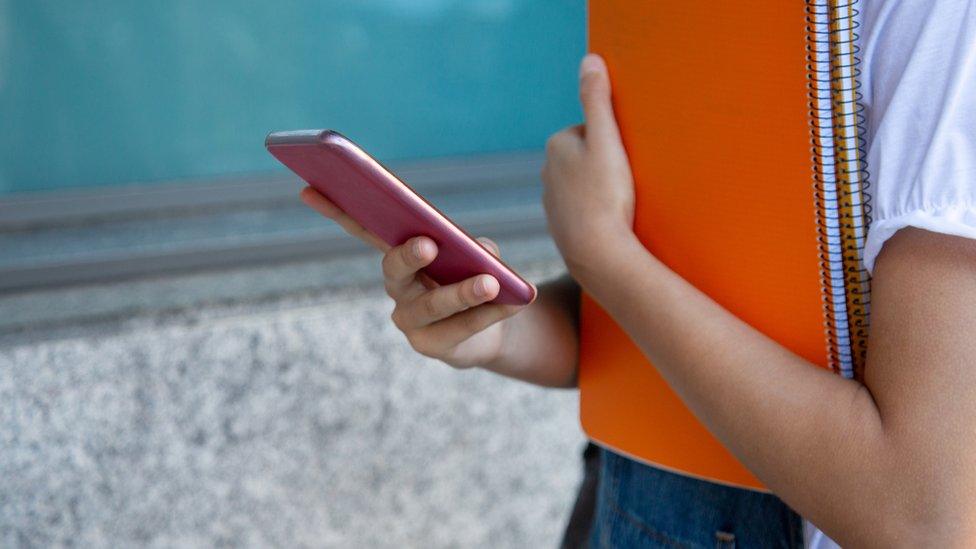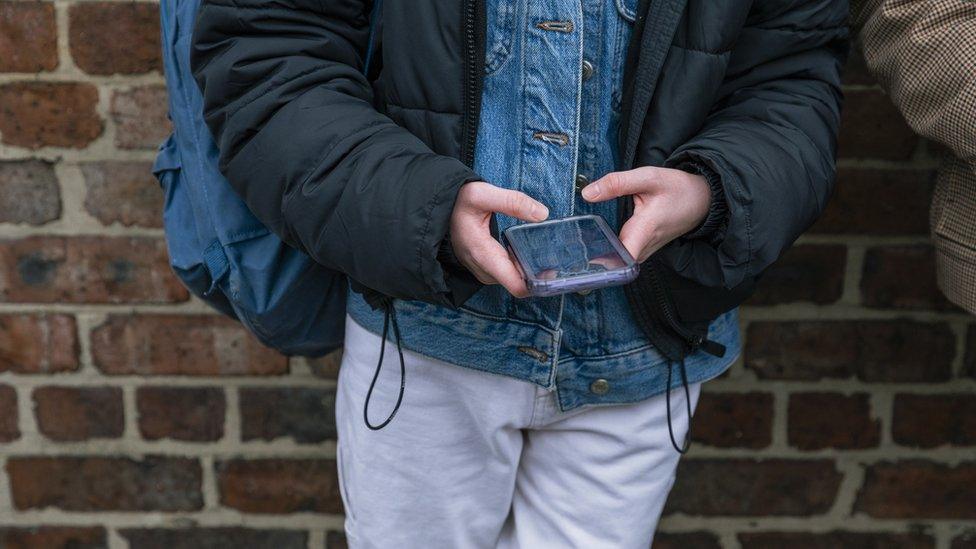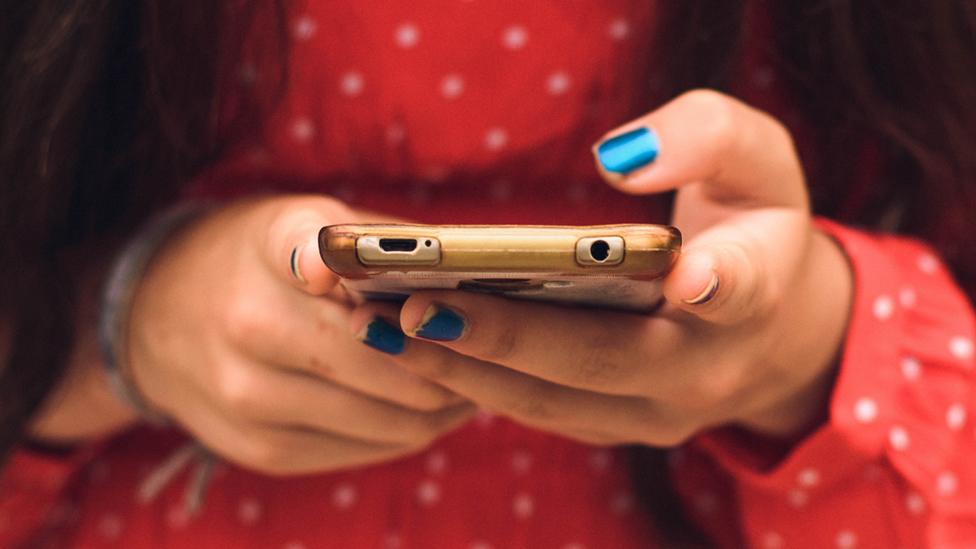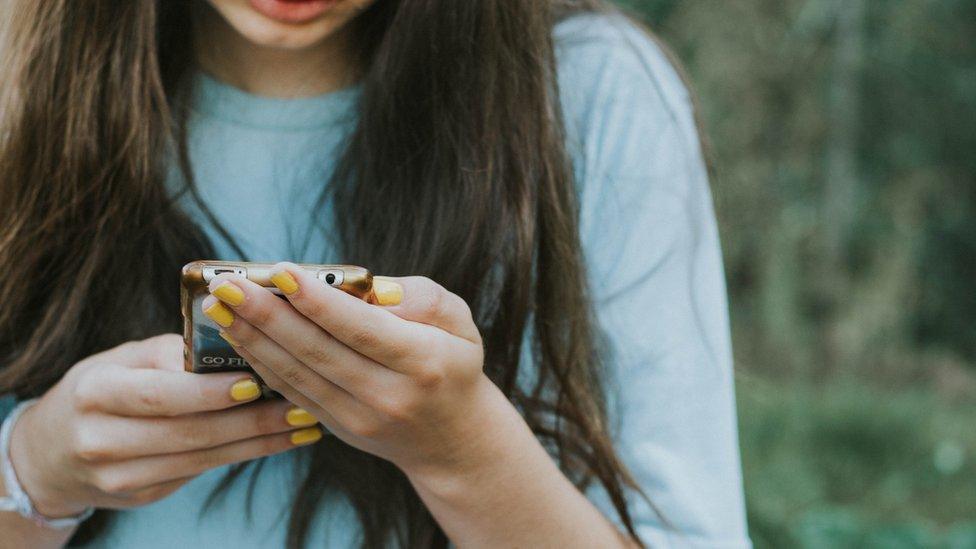Online grooming: Mum calls on government for more help
- Published

Cases of online abuse and harm have increased in recent years, according to a charity
The impact of online grooming on its young victims can be immense and wide ranging. An ever-increasing variety of social media platforms and means of communication have made the risk bigger than ever. As one young victim tells the BBC of her ordeal, there is growing concern that UK schools do not have the necessary resources and knowledge to help parents protect children from online harm or to identify those who are at risk, despite the best of efforts and intentions.
"I felt really betrayed. Why would you ever do that to someone?" said Sarah*, a teenage victim of online grooming.
The 13-year-old said she was shocked and confused when she realised what had happened to her.
The teenager thought the person who had approached her on Snapchat was a friend-of-a-friend, another teenager who liked her.
The two had never met in real life but Sarah said the person she was talking to was very complimentary, telling her she was "gorgeous".
As they shared messages, Sarah felt as if she had developed a trusting relationship with a peer, someone who cared for her.
So when that same person asked Sarah to share explicit images of herself she felt she had no choice but to do so.
"I didn't realise what was going on," she said.
After sending the images, she was pressured and ultimately blackmailed into sending more.
But as if the initial incident was not enough for the schoolgirl to contend with, the pictures caused even more distress for Sarah, much closer to home.
Her Snapchat account was accessed by a pupil at her school and the images were found and subsequently distributed among other pupils, causing her even more pain.
"Initially it was embarrassment, anger and then shock," she said, adding: "I was a bit confused."
Despite the huge trauma and emotional toll, Sarah kept quiet about what she was going through from her mother, Emma*.
She only discovered what had happened to her daughter after receiving a phone call from the teenager's school, once the images had been distributed among pupils.
"I was shocked," said Emma, adding: "I always thought people were better than that.
"I also felt I should have known, I should have found it out sooner. I felt guilty."
'Very complicated'
Emma said teachers tried to help the teenager but the support given was not enough due to the manner of the abuse and scale of the problem.
She said that after the images were distributed among pupils, staff at the school did not fully recognise the trauma Sarah faced. Some of the actions taken by teachers even further exacerbated Sarah's anxiety.
"The school tried their best but they did not know what to do. They were dealing with something very complicated," she said.
She now wants changes and better support in schools, and is calling on the government to step in and ensure teachers receive better support to deal with similar cases.
She believes there should be someone within the Department for Education (DfE) that teachers can turn to if they need further support and guidance.
Emma is also calling on parents to make their children aware of the impact that distributing such images among pupils can have on the victims.
"For Sarah it was also how her peers treated her, they thought it was funny to share such images," Emma said.
"That is not acceptable... they should be realising that is wrong.
"What is worrying me is that this is being normalised. We have to educate them, teaching them to have empathy and compassion."
Emma has decided to share the experiences of her and her daughter in the hope it will lead to improvements and stop more children becoming victims of online grooming.
"I just think we owe our children," she said.
'Lack of resources'
Her call has been backed by the Marie Collins Foundation, a charity that supports victims of technology-assisted child sexual abuse and exploitation.
They have seen a growing number of cases in recent years, as more and more abusers turn to online platforms to find their victims.
Its chief executive, Vicki Green, said there should be a "realistic understanding" of the capacity within schools.
"That's for the DfE," she said, adding: "Are they funding schools enough?"
"I think the bottom line is that schools don't have the time or the resources to be able to address this properly, and that needs to be acknowledged."

Teachers would like to receive more training and support, a trade union said
The National Police Chiefs' Council said parents, schools and those working with children all have a "crucial role" in talking to them about healthy relationships and the "ramifications of sharing these images".
Hampshire Constabulary is one police force that has recently increased the number of officers dealing with these issues, and is looking to grow its partnership with local schools.
Inspector Katie Clift, of the force, said that after talking to some students it had emerged some teachers felt more comfortable than others in talking about these issues.
She suggested teachers would benefit from more training when they are still studying at university.
'Patchy provision'
"I think having that investment in that training earlier on to know how to approach these subjects, as opposed to just being thrown in at the deep end, could really help that education," she said.
The National Education Union (NEU) said teachers were "extremely concerned about rising levels of sexual harassment, online and face to face".
"Good quality relationships and sex education is essential, but provision is patchy," the NEU said.
It added teachers would like more training and to be supported "to keep up to speed with changes in social media platforms and technology".
Snap, the company behind Snapchat, said it had a dedicated team working with the authorities and experts to combat child abuse.
"We have extra protections for under 18s to make it even harder for them to be discovered and contacted by people they don't know," the company added.
The DfE said it had been supporting teachers with training and guidance "including expert-led webinars to build teachers' confidence in the most challenging areas".
"Further guidance will also be published soon to support teachers in areas of sensitive topics, like sexual abuse and harassment, and to help teach a curriculum that fosters open conversation with students," a DfE spokesperson added.
The new guidance is expected to also focus on how to deliver relationships, sex and health education.
Whilst any new guidance and changes will be too late to help Sarah, she is hopeful that her experience will at least help other children and teenagers avoid going through what she had to endure.
Rather than suffering in silence for so long, she now thinks she should have spoken with her parents earlier.
"Tell someone about it before it gets bigger, don't just leave it," Sarah added.
*Names have been changed to protect identities.

If you have been affected by the issues raised in this story, information and support can be found via BBC Action Line.

Follow BBC South on Facebook, external, Twitter, external, or Instagram, external. Send your story ideas to south.newsonline@bbc.co.uk, external.
- Published23 July 2021

- Published22 June 2021
